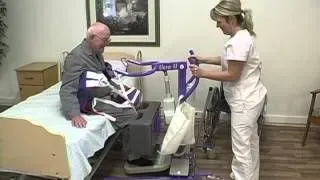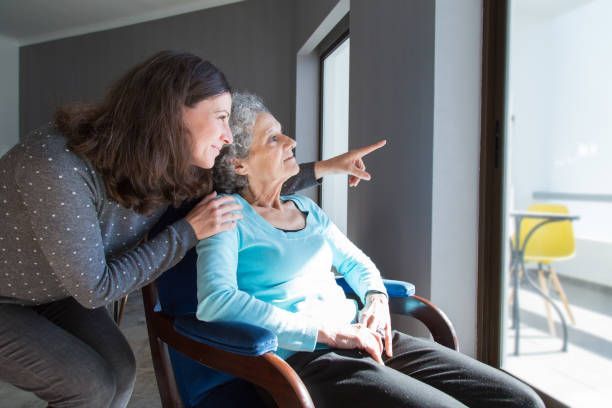What is a Hoyer Lift Used For?
What is a Hoyer Lift Used For?
At 7 Day Home Care, we understand the importance of using a Hoyer lift to safely transfer individuals with limited mobility, providing essential support for both patients and caregivers. This mechanical device is designed to lift and move patients from beds, chairs, or other surfaces without causing strain on caregivers or discomfort for the patient. For elderly individuals or those with mobility challenges, the Hoyer lift ensures safe, gentle transfers while preserving their dignity. For home health aides, it reduces the risk of physical injury, such as back strain, that can result from manually lifting patients. However, the effectiveness of a Hoyer lift depends heavily on proper training. At 7 Day Home Care, we ensure our aides are thoroughly trained in the use of this device, prioritizing safety, comfort, and efficiency. This specialized training is crucial for preventing accidents and ensuring that both caregivers and patients benefit from this essential tool. 7 Day Home Care is licensed by the New York State Department of Health to provide home care services in Manhattan, Queens, Brooklyn, Nassau County, and Suffolk County, New York. To learn more about our home care services, please call 516-408-0034.

Are You Searching for a Home Health Aide Near Me
Trained in Using a Hoyer Lift?
When caring for individuals with limited mobility, especially those who are elderly or disabled, it is essential to use the right equipment to ensure safety and comfort. One such piece of equipment that plays a pivotal role in caregiving is the Hoyer lift. In this article, 7 Day Home Care explains what a Hoyer lift is, its primary uses, and how it can improve the quality of life for both caregivers and patients.
What is a Hoyer Lift?
A Hoyer lift, also known as a patient lift, is a mechanical device designed to assist caregivers in transferring individuals with limited mobility. These lifts are commonly used in home care, nursing homes, and hospitals to move patients from one location to another without causing strain on either the patient or the caregiver.
Named after its inventor, Ted Hoyer, this device uses a sling system to safely lift and transport individuals from beds, chairs, wheelchairs, or other surfaces. It is particularly useful for those who are unable to bear weight or have conditions that make manual transfers risky or impossible.
There are two main types of Hoyer lifts:
1.Manual Hoyer Lift: Operated using a hydraulic system, the caregiver pumps a handle to raise or lower the patient.
2.Electric Hoyer Lift: Powered by electricity, this lift requires less physical effort from the caregiver, making it more convenient, especially for frequent use.
Key Uses of a Hoyer Lift
1. Safe Patient Transfers
The primary function of a Hoyer lift is to safely transfer individuals who have difficulty moving on their own. Whether it is transferring someone from a bed to a wheelchair or from a chair to a shower, the Hoyer lift ensures that these movements are performed with minimal risk of injury to both the patient and the caregiver.
Manual transfers can be dangerous if done improperly, especially if the patient is heavy or has severe mobility issues. Using a Hoyer lift prevents falls, reduces the risk of back strain or muscle injury for caregivers, and promotes a sense of security for the patient.
2. Enhancing Comfort and Dignity
For individuals who are unable to move without assistance, the process of being transferred can feel invasive or uncomfortable. The sling used in a Hoyer lift cradles the patient securely, distributing their weight evenly and minimizing pressure points. This makes the transfer process smoother and more comfortable, enhancing the patient’s dignity during movement.
For example, individuals with conditions such as ALS, Parkinson’s disease, or severe arthritis may feel anxiety when being moved manually. The Hoyer lift’s gentle, mechanical motion can help them feel more relaxed, knowing that they are being moved safely.
3. Reducing Caregiver Strain
Caring for someone with limited mobility often requires significant physical effort, which can lead to caregiver burnout or injury. Using a Hoyer lift greatly reduces the physical strain on caregivers, allowing them to safely lift and move individuals without risking their own health. In home care settings, where a single caregiver may be responsible for a patient’s daily transfers, the Hoyer lift becomes an invaluable tool.
For those providing long-term care, using a Hoyer lift can prevent chronic issues such as back pain, muscle strain, or repetitive stress injuries, making it easier to provide high-quality care over time.
4. Assisting with Bed Mobility and Positioning
A Hoyer lift can also be used to reposition individuals in bed. Patients who are bedridden for extended periods need to be repositioned regularly to avoid issues like pressure sores (bedsores). The lift allows caregivers to safely turn or reposition the patient without manual lifting, reducing the risk of skin breakdown and improving overall bedside care.
Moreover, the lift can be used to assist with activities like changing bed linens or adjusting the patient’s position for better comfort and circulation.
5. Bathing and Hygiene Assistance
Many Hoyer lifts are equipped with water-resistant slings, making them ideal for bathing and other hygiene-related tasks. Transferring an individual into a shower chair or bath can be challenging and dangerous without the proper equipment. A Hoyer lift allows caregivers to move patients easily into a shower or tub, ensuring that they can maintain personal hygiene without risking injury.
This is particularly important for individuals with paralysis, spinal cord injuries, or those recovering from surgeries where mobility is restricted. Proper bathing is essential for health and well-being, and the Hoyer lift makes this process both safe and efficient.
6. Post-Surgery Recovery
After certain surgeries, such as hip replacement, spinal surgery, or knee surgery, patients may be temporarily unable to move or bear weight. A Hoyer lift can be an essential tool in these situations, allowing caregivers to move patients without disturbing the surgical site or causing unnecessary pain.
Additionally, for patients recovering at home after hospitalization, the use of a Hoyer lift ensures that they can be safely moved without the need for multiple caregivers or risky manual transfers.
7. Improving Quality of Life for Long-Term Patients
For individuals with chronic conditions that limit mobility, such as multiple sclerosis or muscular dystrophy, a Hoyer lift can greatly improve their quality of life. Being able to move safely and comfortably between different positions allows these patients to engage in daily activities such as eating at a table, sitting in a living room, or enjoying outdoor spaces. This can help maintain mental well-being and provide a sense of independence, even when physical mobility is limited.
Choosing the Right Hoyer Lift
When selecting a Hoyer lift for home care, it is important to consider the patient’s needs, the caregiver’s capacity, and the space available in the home. Here are some factors to keep in mind:
1.Patient Weight and Size: Different Hoyer lifts have varying weight capacities, so it is important to choose a lift that can safely accommodate the individual being cared for.
2.Manual vs. Electric: While manual lifts are less expensive, electric lifts require less physical effort and may be better suited for long-term use or frequent transfers.
3.Space Constraints: Consider the layout of the home, including doorways, room sizes, and the areas where transfers will take place. Portable or compact models may be necessary for smaller spaces.
4.Sling Types: There are different slings for various purposes, including bathing slings, positioning slings, and full-body slings. Selecting the right sling is crucial for ensuring patient comfort and safety.
5.Ease of Use: For home caregivers, it is essential that the lift is easy to operate and maintain. Some lifts are designed to be lightweight and portable, making them ideal for home use.
How to Use a Hoyer Lift Safely
While Hoyer lifts are designed to enhance safety, it is still important to follow best practices to ensure smooth and secure transfers. Caregivers should:
•Receive proper training: Before using a Hoyer lift, caregivers should be trained on its operation to prevent accidents or misuse.
•Check the equipment regularly: Ensure that the lift is in good working order, checking for any signs of wear or damage to the sling, straps, or mechanical parts.
•Communicate with the patient: Keep the patient informed about each step of the transfer process, helping to reduce anxiety and ensure cooperation.
•Follow weight limits: Always adhere to the manufacturer’s guidelines regarding weight capacity to avoid mechanical failure or injury.
The Hoyer lift is an essential tool for providing safe, dignified, and efficient care for individuals with limited mobility. Whether used for transfers, repositioning, or bathing, it significantly reduces the risk of injury and enhances the quality of life for both patients and caregivers. At 7 Day Home Care, we are committed to ensuring that every individual receives the best possible care, and we believe that using the right equipment, like a Hoyer lift, is crucial to achieving this goal.
For more information about using a Hoyer lift or to discuss personalized care plans, feel free to contact 7 Day Home Care. Our team is ready to assist you with all your home care needs, ensuring safety, comfort, and dignity for you and your loved ones. 7 Day Home Care provides home care services in Manhattan, Queens, Brooklyn, Nassau County, and Suffolk County, New York. To learn more about our home care services near you, please call 516-408-0034.
Brian Callahan
7 Day Home Care










